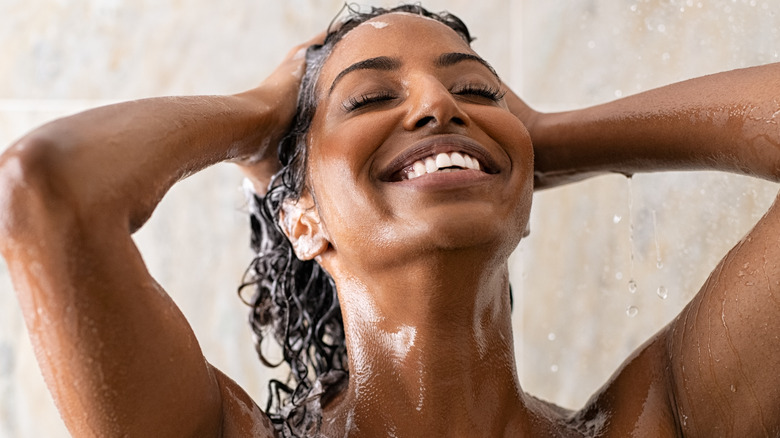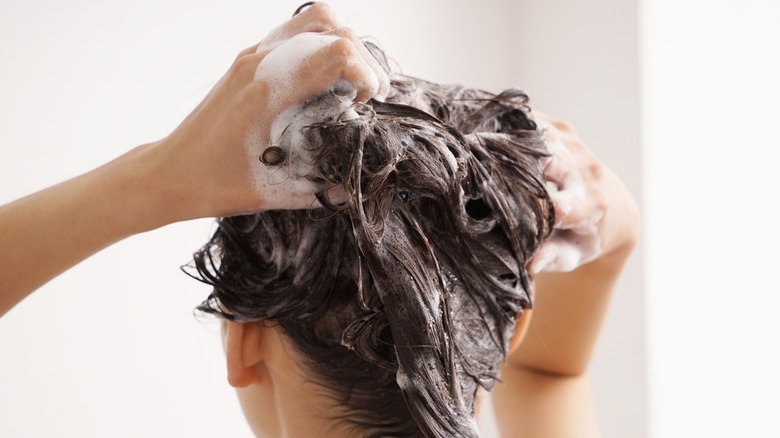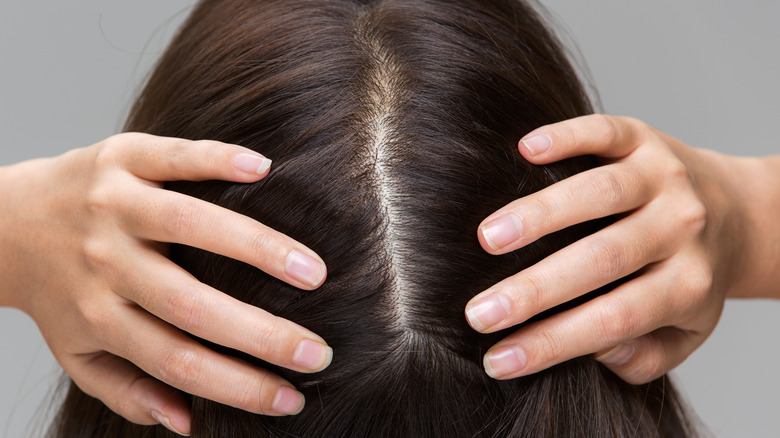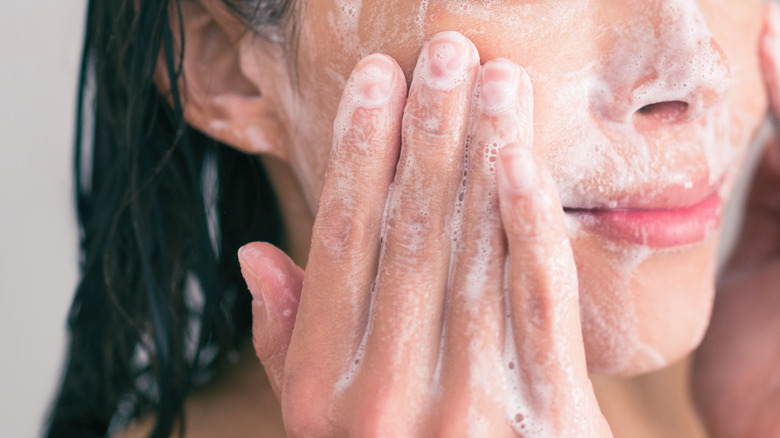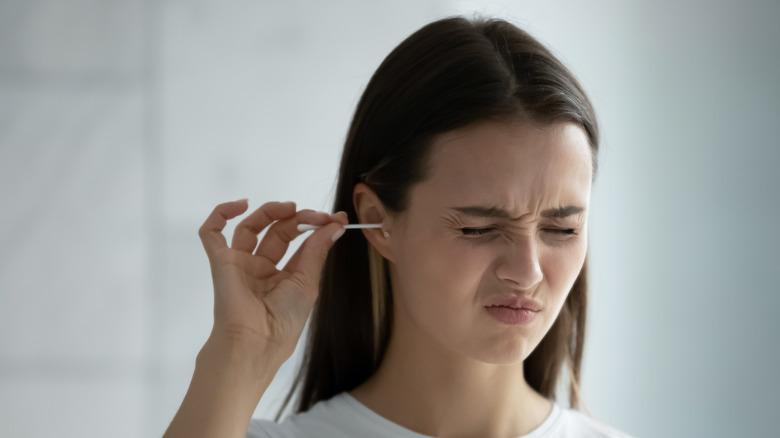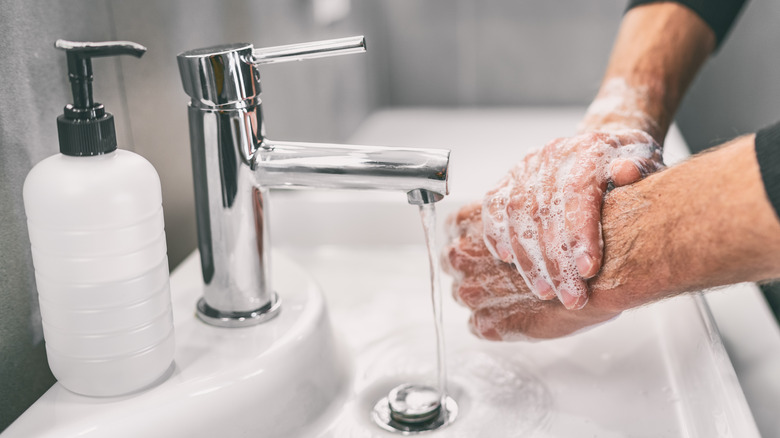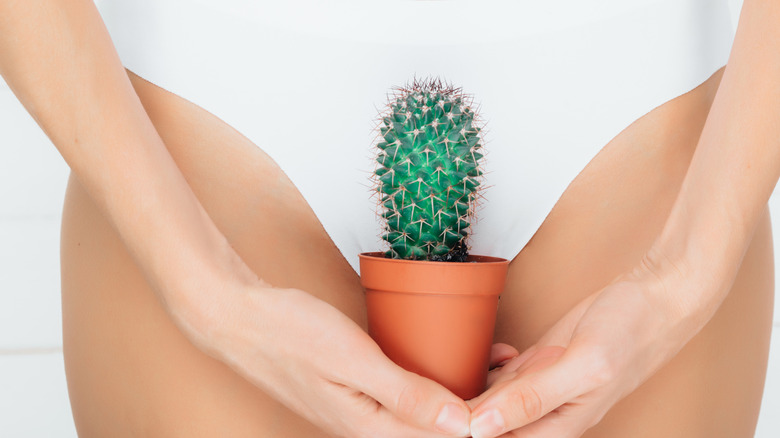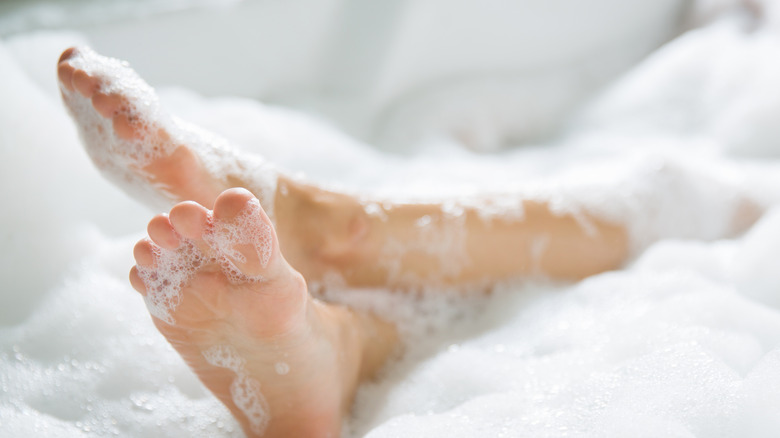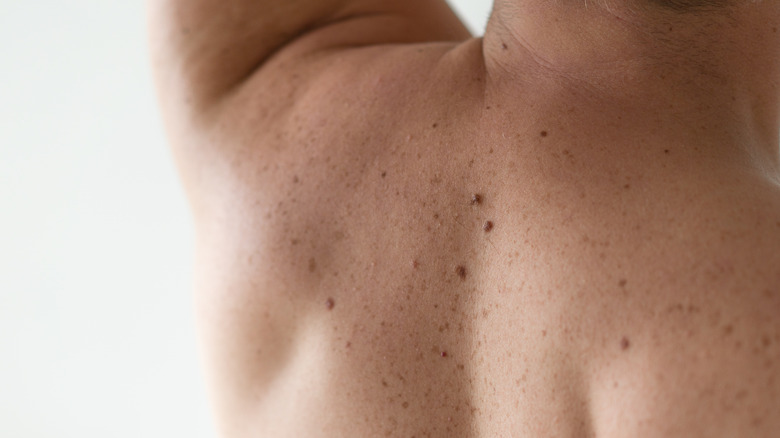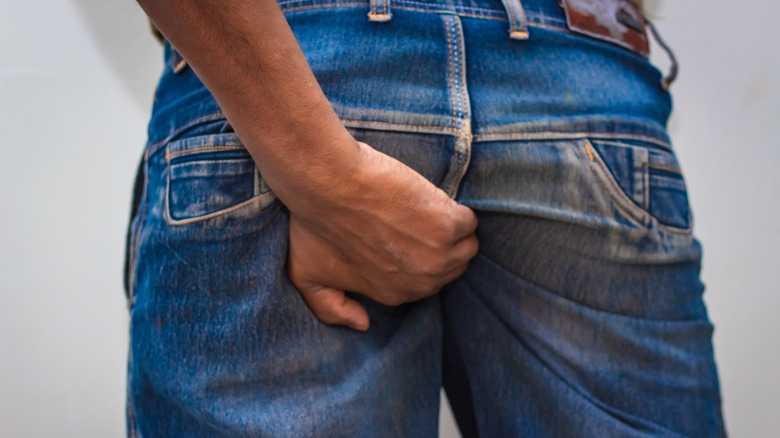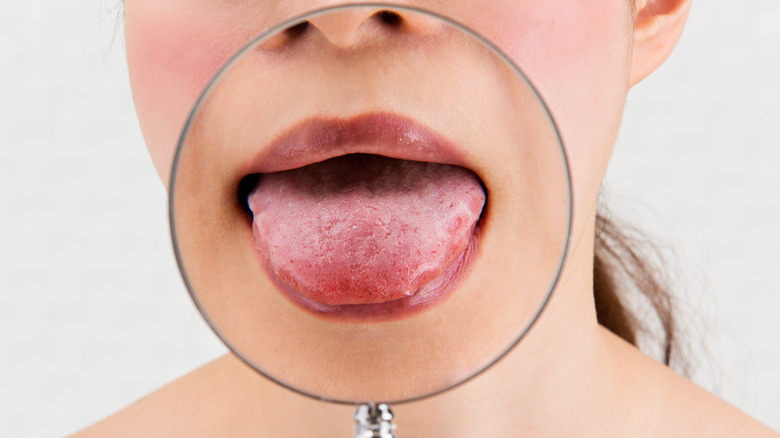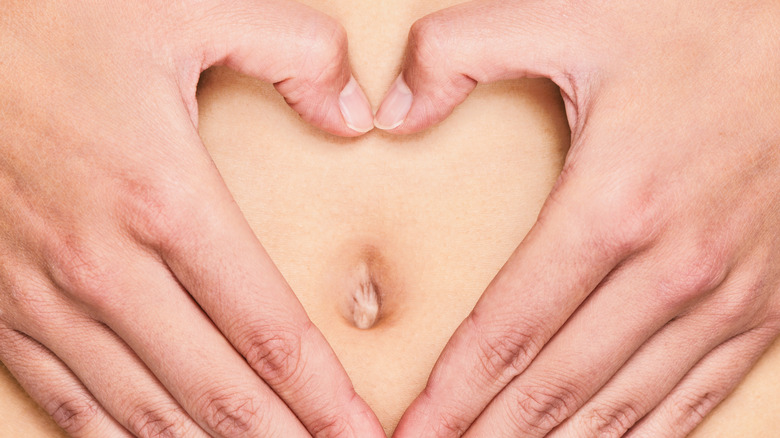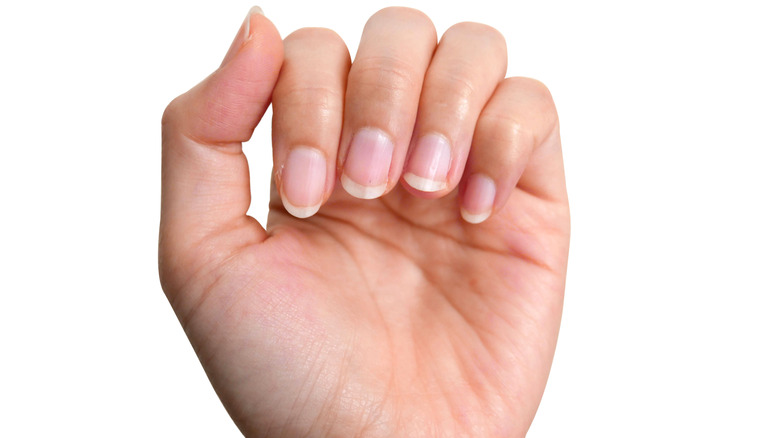Parts Of Your Body You're Probably Not Washing The Right Way
For most, bathing is a pretty straightforward ritual. Most people have their routines down to a T and don't often think about ways they could improve or add onto what may already appear to be working. "If it's not broke, don't fix it," right? But what if there were things you could be doing differently to improve your personal hygiene that you'd never stopped to consider? There's always new research being conducted on how to optimize the human body in regards to nutrition, fitness, and health, and personal hygiene is just another category where we are growing our body of knowledge on best practices.
If you have been sticking to the same routine since your parents first taught you to bathe, it might be time for a refresher course. Whether you're curious about how to improve your hair, skin, nail, or even your ear cleaning routine, you're likely to uncover some new insights if you continue reading. Here are 14 parts of your body you might be washing incorrectly — and what you should be doing instead.
Your hair
While your hair washing routine might seem like second nature, there are actually several commonly held beliefs around this ritual that might be causing more harm than help. One of the first misconceptions about washing your hair is that it needs to be done every day. According to Healthline, washing your hair every day can remove the natural oils it needs to stay healthy, and can dry it out and cause long-term damage. Being aware of your hair type — for example, whether it's oily or dry — will inform you of how often you need to wash it. Oilier hair types will need to be washed every two to three days, while drier hair may only require washing once or twice a week.
For those with coarser or afro-textured air, it may be best to forego shampoo altogether. Monica Davis, a professional hair styler, spoke to Healthline an explained the benefits of co-washing: "Co-washing hair products are cleansing conditioners that provide moisturizing along with extra-gentle washing." She adds, "Dry and coarse hair is more vulnerable, so a co-wash is a great idea to restore it. Basic shampoos have more surfactant ingredients for foaming, while co-washes have more conditioning ingredients."
Your scalp
When focusing on the top of the head, the scalp is all too often forgotten. While many people may gloss over this aspect of personal care, your scalp health actually plays an important role in our overall hair health (via Well + Good). Shab Reslan, a trichologist and hair health expert at HairClub, spoke to Well + Good and shared her perspective on this part of the hygiene ritual: "Proper scalp care is often overlooked by many people since the focus is mainly on the aesthetic of hair itself. Much like the importance of quality soil in order for a plant or flower to grow from, the scalp requires a balanced and healthy environment in order to grow its best hair," she said.
The biggest mistake here, Reslan says? Not washing your hair thoroughly, and leaving either product or sebum on the scalp. To solve this problem, she suggests shampooing your hair twice in the shower with a shampoo that is gentle enough to not strip it completely of your natural oils. According to Medical News Today, while some sebum (our hair's natural oil) can be good to soften the hair, a buildup of sebum on the scalp over time can lead to flaking, itching, crusty skin, and redness.
Your face
If you are someone who is used to a "lather, rinse, repeat" cycle when it comes to washing your face, you might want to reconsider your approach. Similar to hair washing, how you wash your face will vary depending on your skin type, as well as your cleansing goals (via Healthline). One factor you may have not considered when washing your face is water temperature. While you may like it hot, your skin may not. Joshua Zeichner, director of Cosmetic and Clinical Research in Dermatology at Mount Sinai Hospital in New York City, spoke to Self and gave his expert opinion. He says, "Extreme temperatures, such as hot, steamy showers or hot water, can cause dilation of blood vessels and breakage of delicate tissue. Further, the hot water naturally strips skin of the necessary oil barrier that helps maintain skin integrity." Instead, the publication suggests using lukewarm water to avoid over-drying the skin.
Another rookie mistake when it comes to face washing is not choosing the right cleanser for your skin type. According to Self, assessing whether you have oily, combination, or dry skin — or have acne — will all affect the type of cleanser you choose, so make sure to do your research beforehand.
Your teeth
It might be the first thing you do when you wake up, but how often do you stop to think about your teeth brushing habits? Starting from the top, choosing the right brush can have a major effect on your dental health. Kimberly Harms, a dentist from Farmington, MN, spoke to WebMD and shared tips on selecting the proper brush. "The one thing that we really insist upon — it's very important — is it has to have soft bristles. The bristles need to be able to bend, to kind of get right under that gum."
Another mistake many make is brushing too hard. Dentist Matt Messina told WebMD: "I think one of the biggest issues that people have is that they try to scrub their teeth too hard. They feel like if they really don't go at the teeth, like they're trying to clean the grout in their bathroom tile, that they're not doing the right job." Instead, Messina suggests a total change in perception. "The best way to fix this is to take away the mental issue of 'scrub' and 'scrub brush' and replace it with the word 'massage.'"
Your ears
If you are struggling with wax builduip in your ears, the best approach to fix this problem might not be what you think. Ear, nose, and throat specialist Anh Nguyen-Huynh spoke to the Cleveland Clinic to provide sound, expert advice. To start, Nguyen-Huynh says we might actually be overdoing it when it comes to cleaning our ears. "Sometimes, trying to clean them causes more problems than it's worth. Ears are like self-cleaning ovens. When the outer layer of skin in the ear canal sheds, the wax will fall out with it."
Believe it or not, she actually suggests staying away from cotton swabs to clean your ears altogether. "A cotton swab acts like a ramrod in an old-style cannon. The tip pushes the ear wax in deeper, so the more you use it, the more ear wax you push in. Plus, you may rupture your eardrum if you push too far. Or if you scratch your ear canal, it can get infected because now dirt and bacteria can penetrate under your skin." If you are truly struggling with a buildup of wax, she suggests using over-the-counter ear cleaning drops, or olive or mineral oil.
Your hands
While handwashing has risen to the forefront of personal hygiene habits due to the pandemic, there are still some techniques that deserve reinforcement. One of the primary concerns regarding proper handwashing is how long you should be doing it. If you're a rusher and are used to just popping your hands under the faucet for a few quick seconds, you might want to linger a little longer. According to the Centers for Disease Control and Prevention (CDC), you need to scrub your hands for a minimum of 20 seconds — and yes, that's just scrubbing. This means those 20 seconds do not apply to the time it takes you to wet, lather, and rinse your hands.
According to the FDA, another common mistake people make when washing their hands is using antibacterial soap. The FDA states that there is not enough evidence to prove over-the-counter antibacterial soaps are more effective at preventing the spread of disease than regular soap and water. Furthermore, studies show that triclosan, a common ingredient found in antibacterial soaps, negatively affects hormone function in the bodies of animals, which raises concerns about potential harm in humans. Not to fear, however: Washing with regular soap and water is highly effective when done correctly.
Your groin
Yep — let's talk about it. For both men and women, keeping this area clean and fresh is a must to keep germs at bay. John Zampella, assistant professor of dermatology at NYU Langone's Tisch Center for Men's Health, spoke to Men's Health magazine and explained thusly: "The nether regions are a part of your body that are warm, moist, and dark — the essentials for breeding germs. The presence of bacteria in this area can lead to bad smells, skin infections, and skin breakdown." Because the skin "down there" is thinner than in other areas of the body, Zampella suggests that men should wash the entire groin area daily with a gentle soap that is fragrance-free. Afterwards he suggests drying the area by patting it down, and lastly using a powder to keep excess moisture at bay.
For women, the same basic rules apply. While the vagina is self-cleaning, the vulva, which is the external part of the genitals, can be cleansed with a gentle soap (via Medical News Today). The site explains that using a douche can negatively affect the pH of the vagina, so it's best to focus only on the vulva. To clean this area, it's recommended to use warm water with a gentle, fragrance-free soap, as fragrance can cause irritation.
Your feet
It's okay to admit that washing your feet can sometimes feel like an afterthought. After you've showered and felt all the soapy water running over your feet into the drain, you might think your job is done. Alas, it is not. The feet require the same amount of attention and care as the rest of your body, and not cleansing them properly can lead to some unwanted side effects.
Robert K. Lee, chief of podiatric foot and ankle surgery at UCLA Medical Center, Santa Monica, spoke to Self magazine to share his thoughts: "Bacteria [like] to feed on waste products that come out of your sweat glands, and they produce odor as they build up," he explained. In addition to odor, staph infections, Athlete's Foot, and Plantar's Warts are a few of the infections that can result from improper foot care. Really getting in there with soap and water not only reduces the risk of infection, but it can also help prevent dead skin from building up, which can lead to calluses. "The actual act of scrubbing or brushing (not just rinsing with water) helps to exfoliate your feet," according to Lee (via Self).
Your back
The back is another part of our anatomy that often becomes an afterthought, which is precisely why it's made it onto the list. One of the primary reasons you might not be cleaning your back properly is simply a question of flexibility. Hygiene and skin-care expert Allison Gallo spoke to Dollar Shave Club to offer a solution: "Grab a soapy washcloth by its two diagonal corners, and hold it behind your back — one hand should be just above your shoulder and the other should be towards the bottom of your back. From there, simply rub it back and forth, then switch hands and repeat." In other words, it's like drying your back with a towel.
Adwoa Danso, a general practitioner for the UK's National Health Service, spoke to Elle UK to explain what could happen if you neglect cleaning the back. "Back acne is typically caused by a build up of oils and dead skin cells in and around pores. The pores can become clogged and attract bacteria which thrives. This causes leads to an inflammatory response of the skin causing pustules and bumps." To manage back acne, the site suggests switching to a shower gel that contains acne fighting ingredients such as salicylic acid or lactic acid.
Your butt
Thought wiping was enough? Not quite. Anal surgeon and founder of Future Method, Evan Goldstein spoke to Well + Good and offered his expert opinion on how to get your rear end in tip-top shape. The first step? "I would tell people to move away from a wiping technique and do blotting instead," he explained. "What happens is that the skin is the thinnest part of anyone's butt back there by the tailbone, so when you wipe front to back, that skin has the highest chance of being irritated." Goldstein also suggests eating a diet that is rich in fiber, which will "bulk up" your stool, thus requiring less wiping.
Secondly, he suggests ditching wet wipes. "Everybody buys them because they think they are wonderful for you, but they cause so much irritation," he said. He goes on to explain that there are actually good and bad bacteria down there, which work together harmoniously — and using wipes essentially throws all of that off balance. Finally, Goldstein suggests making sure you are completely dry after you get out of the shower to avoid moisture collecting between your cheeks. This can lead to a propagation of bacteria and possible infection.
Your tongue
Say "Ahhh!" Because many oral-care routines consist of a quick pass over the teeth, a quick floss, and a quick rinse, the tongue may be left out of the picture altogether. According to Healthline, improperly cleaning the tongue can lead to a "buildup of bacteria, fungi, dirt, food, and dead cells." Not so appetizing. According to WebMD, tongue scraping can potentially help this problem, as scrapers are used to clear the tongue of particles. This can help balance the good bacteria in the mouth, leading to fresher breath, improved taste, and fewer cavities.
Experts at WebMD scraping your tongue after you've brushed your teeth. Run the scraper with light pressure from back to front two to three times, rinsing between each scrape, and then rinse your mouth. The three types of scrapers the site recommends are brush scrapers, plastic scrapers, and metal scrapers. Be advised that tongue scrapers are not meant to replace your regular oral hygiene routine, and are just an addition.
Your belly button
Because it's hidden from plain view, the belly button may not be on the top of your personal hygiene list. Out of sight, out of mind, right? While most people may think taking a shower and allowing the soap and water to run over the area is enough, your belly button actually warrants closer investigation. Alexandria V. Booth, a board-certified dermatologist with HealthCare Partners medical group spoke with Women's Health about the importance of keeping the belly button clean: "Health providers have removed 'growths' from belly buttons that turned out to be a mix of bacteria, dirt, sweat, soap, lotions, and lint. Talk about an embarrassing doctor's visit — they go in for what they think is skin cancer and find out it's just years of dirt." Yikes.
If you have an innie, to properly clean the area the magazine suggests using a cotton swab soaked in either soap and water or rubbing alcohol to gently swab the area. For those with an outie, you can use a warm washcloth to softly cleanse it.
Under your nails
While washing your hands is a great way to stop the spread of bacteria and disease, soil, grease, and other things can still get stuck under your nails and contribute to the spread (via Healthline). There are a few steps you can take to clean underneath your nails, one of which is using dish soap — which is made to eliminate grease more effectively — to wash your hands. Healthline also suggests using lukewarm water instead of hot or cold, and using a cuticle stick to clean out the "gunk." Keeping your nails short is another viable option to keep your nails clean, as there is less space for dirt and bacteria to gather.
Dana Stern, a dermatologist in New York, spoke to Women's Health and offered some additional tips: "Digging your nails into a bar of white soap in the shower will help to pull out dirt and debris and makes the whites of your nails whiter," she explained. She also suggests staying away from thick hand creams that can gather underneath the nail and attract moisture and dirt, and opting for a moisturizing oil instead.
Your armpits
Learning how to properly take care of your underarms is a part of your personal hygiene routine that should not be missed. Alicia Zalka, dermatologist and founder of Surface Deep, spoke to Vogue about this area of the body and said: "Proper care and cleansing is important to reduce unwanted moisture and keep the natural balance of the microbiome ... yet, doing so must be approached delicately." She suggests washing your underarms only once a day unless you are sweating a lot.
Vogue also recommends exfoliating under your arms to keep them pristine. So why's that, you ask? The underarm can generate "Too much oil, clogged pores, pimples (known as folliculitis), and a buildup of dead, dull, and sometimes discolored skin cells," according to Dr. Zalka. Both physical exfoliators (such as scrubs) and chemical exfoliants (such as acids) are great ways to reduce buildup, and Dr. Zalka specifically recommends a glycolic acid toner to take care of this area. Regarding deodorants, she suggests using a gentle deodorant that contains as few chemicals as possible, and avoiding aluminum whenever possible.

